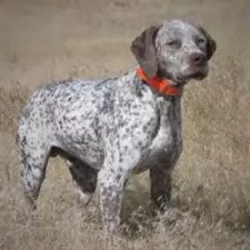 MyDogBreeds
MyDogBreeds Russell Terrier is originated from United Kingdom but Braque du Bourbonnais is originated from France. Russell Terrier may grow 22 cm / 8 inches shorter than Braque du Bourbonnais. Russell Terrier may weigh 13 kg / 28 pounds lesser than Braque du Bourbonnais. Both Russell Terrier and Braque du Bourbonnais has almost same life span. Both Russell Terrier and Braque du Bourbonnais has almost same litter size. Both Russell Terrier and Braque du Bourbonnais requires Low maintenance.
Russell Terrier is originated from United Kingdom but Braque du Bourbonnais is originated from France. Russell Terrier may grow 22 cm / 8 inches shorter than Braque du Bourbonnais. Russell Terrier may weigh 13 kg / 28 pounds lesser than Braque du Bourbonnais. Both Russell Terrier and Braque du Bourbonnais has almost same life span. Both Russell Terrier and Braque du Bourbonnais has almost same litter size. Both Russell Terrier and Braque du Bourbonnais requires Low maintenance.
 This feisty little dog was developed in England a couple of centuries ago. He has a well documented history. An interesting aspect with this dog is that the very name ‘Jack Russell’ became a common name for predominantly white terriers after the death of clergyman Jack Russell.
This feisty little dog was developed in England a couple of centuries ago. He has a well documented history. An interesting aspect with this dog is that the very name ‘Jack Russell’ became a common name for predominantly white terriers after the death of clergyman Jack Russell.
The Russell Terrier was developed from Jack Russell working terrier strains that were used in the 19th century for hunting fox. The dog has been standardized by Kennel Club recognition. The Fedédération Cynologique Internationale also recognizes the breed.
It was in the early 1970s that the Jack Russell Terrier Club of Great Britain was formed.
 The Braque du Bourbonnais is an ancient breed, seen in the 15th century in France in the province of Bourbonnais. He became extremely popular with hunters by the 1800’s as a good pointer. He has become very popular in the United States and all of North America. There are often more puppies born in the U.S. than in France. The British call this breed the Bourbonnais Pointing Dog.
The Braque du Bourbonnais is an ancient breed, seen in the 15th century in France in the province of Bourbonnais. He became extremely popular with hunters by the 1800’s as a good pointer. He has become very popular in the United States and all of North America. There are often more puppies born in the U.S. than in France. The British call this breed the Bourbonnais Pointing Dog.
As with so many European hunting and working dogs, the Braque du Bourbonnais almost disappeared following World War I but was saved by the first breed club, established in 1925. Then following World War II, they were again in danger as the club dissolved and birth rates among the breed decreased drastically.
Actually, there were no dogs at all in the French registry between 1963 and 1973. This was attributed to the fact that the registry put more emphasis on the secondary characteristics such as color, length of tail) instead of the hunting characteristics. Because of this some hunter-breeders vowed to bring the real Braque du Bourbonnais back.
Michel Comte took on this task in 1970 but could not find any dogs with pure Bourbonnais blood. So, he took missed breed with characteristics like the Bourbonnais and inbred several litters until he had a dog he was satisfied with. He registered this dog with the LOF in 1973-75. Seeing this several other breeders got into the act and they successfully brought the breed back.
Michel became president of the new Club du Braque du Bourbonnais in 1981 and remained so until 2001. During this time the breed excelled at field trials and was first sent to the U.S. in 1988. The breed is now thriving in both Europe and North America.
 The Russell Terrier has a weatherproof coat that is mainly white with patches of tan or black or maybe even both. You get the smooth haired type, the broken type- as well as the rough haired Russell Terrier. All these coats shed.
The Russell Terrier has a weatherproof coat that is mainly white with patches of tan or black or maybe even both. You get the smooth haired type, the broken type- as well as the rough haired Russell Terrier. All these coats shed.
He is a small dog standing at between 20-35cm in height and weighing between 7 and 12kg.
Your Russell Terrier is a jaunty, fearless, confident little dog with a powerful personality. The bright face with alert eyes are constantly telling you that he is just ready to spring into action when you’re ready.
He just loves games and sports and you won’t have to ask him twice to join in. Happy and energetic, you could say it's his desire to hunt as well as his high energy levels that make it necessary for him to be trained and socialized It is of particular importance because he is so strong willed. Super smart, you won't have any trouble teaching him some basic commands.
He also makes a good watch dog and while he can be aggressive towards other dogs, he is prepared to get along with children in the house who have been disciplined and who know how to treat animals with respect and kindness.
 This is an elegant breed with a medium sized, muscular bod and a round head. The nose will be the color of the coat and the muzzle is cone shaped with a wide base. He has large dark or hazel eyes, again depending on the color of the coat. The ears can drop below the throat and the neck is very muscular. He has a deep, wide chest and straight, muscular legs. The coat can come in two colors – liver and fawn – and ticked or spotted. They have a typical short pointer type tail.
This is an elegant breed with a medium sized, muscular bod and a round head. The nose will be the color of the coat and the muzzle is cone shaped with a wide base. He has large dark or hazel eyes, again depending on the color of the coat. The ears can drop below the throat and the neck is very muscular. He has a deep, wide chest and straight, muscular legs. The coat can come in two colors – liver and fawn – and ticked or spotted. They have a typical short pointer type tail.
 It is true that this very active, very 'in-your-face' dog may not be everybody’s cup of tea. He will be discontent if not given the chance to run and be active.
It is true that this very active, very 'in-your-face' dog may not be everybody’s cup of tea. He will be discontent if not given the chance to run and be active.
If you’re a super active family who loves swimming, going on hikes or you enjoy sports such as cycling and horse riding, you can count the Russell Terrier in every time.
These dogs make a loving, loyal companion. They'll make you smile and be amused by their antics, bringing you lots of joy and entertainment.
 The Braque du Bourbonnais is a gentle, calm dog. He is affectionate and kind when off the job but intelligent, adaptable and serious when hunting. They are intense when learning or hunting and they will learn quickly. They are good with other dogs.
The Braque du Bourbonnais is a gentle, calm dog. He is affectionate and kind when off the job but intelligent, adaptable and serious when hunting. They are intense when learning or hunting and they will learn quickly. They are good with other dogs.
 The Russell Terrier is a robust little dog who can lead a good, healthy life of 13, 14 or 15 years if well cared for. There are however, a number of common dog ailments that he can succumb to. Some of these are cataracts, deafness and myasthenia gravis.
The Russell Terrier is a robust little dog who can lead a good, healthy life of 13, 14 or 15 years if well cared for. There are however, a number of common dog ailments that he can succumb to. Some of these are cataracts, deafness and myasthenia gravis.
This disorder is caused by a breakdown of the transmission of impulses from the nerves to the muscles. The muscles can’t contract and the dog becomes weak. It’s a disease that can be an inherited congenital defect, and the Russell Terrier is at risk of getting this disease. Symptoms do vary from dog to dog but a common symptom is muscle weakness.
 Entropion - both of these are issues with eyelashes turning inward or outward and both can
Entropion - both of these are issues with eyelashes turning inward or outward and both can
 This little dog needs plenty of exercise, and being lazy yourself and not exercising him will lead to him becoming destructive through no fault of his.
This little dog needs plenty of exercise, and being lazy yourself and not exercising him will lead to him becoming destructive through no fault of his.
He will need walks every day as well as runs in the park off his leash. Ball- and frisbee games fill him with delight and he gives chase every time. Even though he is small, he isn’t recommended for life in the city and small properties as he is a small dog with high energy needs and requires a lot of room to run.
The weatherproof coat isn’t going to require much grooming apart from a brushing twice week. Regular checking of the teeth, checking the eyes, looking inside the ears and checking for lumps will be required. He will also need to have his nails trimmed.
Provide him with nice, warm, dry place to sleep.
Have him neutered or spayed if you aren’t wanting puppies.
Keep his vaccines up to date and get him to a vet if you see his is lethargic, miserable and in pain.
Provide him with top quality food, whether it is commercially manufactured food or homemade food.
Your Russell Terrier will be relying on you for good food. Try to include some home-made food for him which can be simply mixed into the kibble twice a week which is easy to prepare and totally uncomplicated.
You can add everything together in one big pot -chicken, brown rice or pasta and spinach, sweet potatoes and carrots. This food can all be chopped up, refrigerated and added warmed up and in small portions to your pets dry kibble once or twice a week.
Simple and tasty, your Russell Terrier will love tasty treats like this. Ensure he always has a bowl of fresh, cool water within his reach.
 This breed is prone to weight gain and obesity. Be careful not to overfeed them. Don’t free feed them but give them 2-3 smaller meals per day.
This breed is prone to weight gain and obesity. Be careful not to overfeed them. Don’t free feed them but give them 2-3 smaller meals per day.
Entropion - both of these are issues with eyelashes turning inward or outward and both can
Pulmonic Stenosis of the heart- minor will have no symptoms but eventually the heart will not be able to function efficiently and could lead to congestive heart failure.
The Braque du Bourbonnais needs at least a minimum amount of exercise daily , especially if he is not used for hunting. A fenced backyard for playtime would be perfect but long walks will work. He likes to learn tricks, play ball or hide and seek. Outside activities could include hiking, swimming, agility, retrieving, rally and obedience trials, along with the usual field trials.